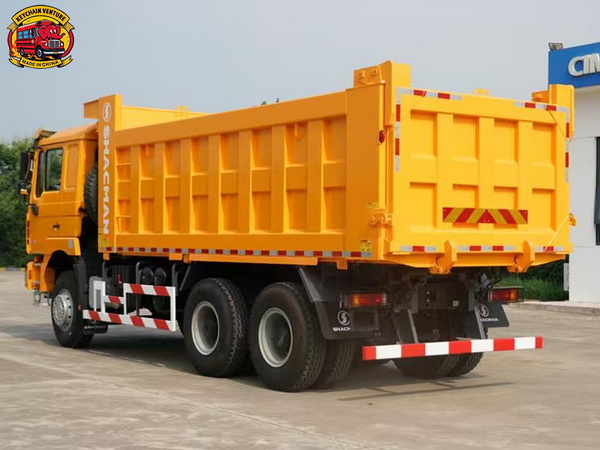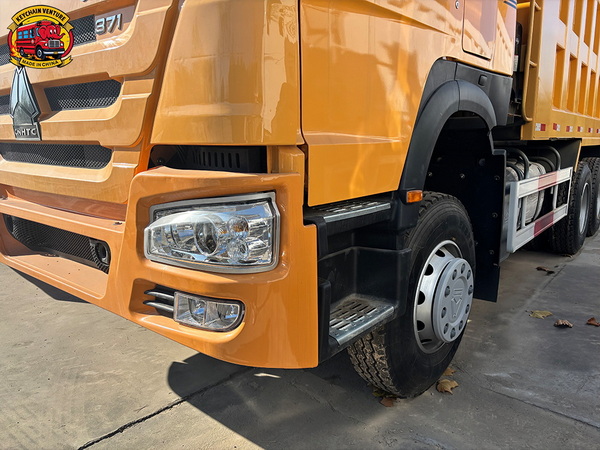Views: 222 Author: Amanda Publish Time: 2025-11-05 Origin: Site








Content Menu
● Understanding Dump Truck Financing
>> Equipment Financing: A Core Option
>> Leases: Flexibility and Upfront Efficiency
>> Loans Versus Leases: A Quick Comparison
● Government and Manufacturer Programs
● Preparing a Strong Finance Package
● The Application Process: Step-by-Step Guidance
● Credit Considerations and Rate Negotiation
● Depreciation, Tax Benefits, and Cash Flow
● Choosing the Right Dump Truck for Financing
● Speeding Up Approval and Reducing Risk
● Common Pitfalls and How to Avoid Them
● Practical Operational Considerations
● Risk Management and Contingencies
● Future Trends in Dump Truck Financing
● FAQ
>> 1. What credit score range do lenders typically require for a Dump Truck loan?
>> 2. How does leasing compare to buying in terms of total cost of ownership for a Dump Truck?
>> 3. What is the typical approval timeline for Dump Truck financing?
>> 4. Is it possible to finance a used Dump Truck, and what are the trade-offs?
>> 5. Which maintenance considerations most impact loan terms and operating costs?
KeyChain Venture Co., Ltd. stands at the forefront of the commercial vehicle sector, delivering high-performance passenger coaches and heavy-duty trucks to domestic and international clients. Expanding a fleet or upgrading equipment often hinges on securing the right financing. This guide walks through practical strategies for obtaining a Dump Truck loan, outlining loan types, lender considerations, and steps to strengthen a financing package. The aim is to help fleet managers, operators, and business owners navigate the process with confidence, ensuring timely access to dependable Dump Trucks that boost capacity and efficiency.

Dump Truck financing refers to arranging funds to purchase, lease, or otherwise acquire a Dump Truck for commercial use. The financing path selected should align with asset lifecycle, cash flow, tax considerations, and long-term strategic goals. Lenders assess vehicle type, age, anticipated utilization, and the borrower's ability to service debt. Common structures include traditional loans, equipment financing, and various leasing arrangements. Each option carries its own ownership, tax, and flexibility implications that influence total cost of capital and monthly payments.
Equipment financing is a staple in Dump Truck lending. A lender provides funds specifically for the purchase of the truck, with the vehicle serving as collateral. This structure typically yields predictable monthly payments over a fixed term, usually ranging from two to seven years, depending on the borrower's credit profile and the asset's expected usage. Key benefits include straightforward ownership at the end of the term and direct alignment with asset depreciation for tax planning. Typical process highlights include verification of income streams, down payment assessment, and lien placement on the Dump Truck until payoff.
Leasing can be an attractive alternative to outright purchase, especially for fleets that prioritize flexibility or upgrade cycles. With a lease, a business pays a regular rental fee to use the Dump Truck for a defined period. End-of-term options may include purchasing the vehicle, returning it, or entering a new lease. Leases often offer lower upfront costs and can include maintenance packages, which reduce unexpected expenses. Tax treatment varies by jurisdiction and lease type, so it is prudent to consult a tax professional familiar with trucking operations.
- Ownership: Loans typically lead to ownership; leases do not unless an option to purchase is exercised.
- Cash flow: Leases often provide lower monthly payments and may include maintenance services.
- Tax treatment: Deductions can differ; leases may allow more deductible operating expenses, while loans may enable depreciation benefits.
- Flexibility: Leases can facilitate regular upgrades, while loans favor asset ownership and long-term asset utilization.
These general distinctions help fleets decide based on budgeting, strategic needs, and risk tolerance.
Some regions offer subsidies, incentives, or loan guarantees to encourage investment in commercial fleets, infrastructure, or environmental upgrades. Manufacturer or dealer financing programs can provide convenient options with streamlined processes or promotional rates, though it remains essential to compare terms with independent lenders. Assessing eligibility for such programs involves understanding qualification criteria, contract commitments, and any service or support packages included.
A well-prepared application enhances approval odds and may secure favorable terms. Core elements include:
- Clear business purpose: articulate how the Dump Truck will generate revenue, including contract backlogs, project schedules, or expected utilization.
- Financial housekeeping: up-to-date financial statements, cash flow projections, and tax returns; clean DSCR (debt service coverage ratio) analysis helps underwrite capability.
- Asset details: vehicle model, year, mileage, payload, maintenance records, and anticipated residual value.
- Down payment and collateral: a larger down payment can improve terms and reduce total financing costs.
- Credit profile: both business and personal credit histories (where applicable) play a role in underwriting decisions.
- Insurance readiness and compliance: proof of appropriate coverage and regulatory compliance minimizes funding risk.
1) Define financing needs: determine the exact Dump Truck model, configuration, and total purchase price.
2) Gather documentation: business licenses, tax returns, financial statements, contracts, and insurance details.
3) Obtain quotes: secure formal purchase agreements or invoices for the Dump Truck.
4) Submit application: include all supporting documents and disclosures required by the lender.
5) Respond to due diligence requests: lenders may request additional proofs of income, collateral, or structural details.
6) Finalize terms and funding: review the loan or lease agreement carefully before signing; the lender will place a lien on the Dump Truck as applicable.
7) Take delivery and begin utilization: ensure delivery aligns with project timelines and maintenance planning.

Interest rates for Dump Truck financing reflect credit quality, collateral value, term length, and vehicle age. Voice considerations include:
- Creditworthiness: commercial and personal credit scores where required.
- Loan-to-value ratio: the percentage of the vehicle value financed; a lower ratio often yields better terms.
- Cash flow strength: stable revenue streams and clear repayment schedules.
- Down payment: larger upfront investment can reduce interest and total cost.
- Collateral and guarantees: additional collateral or guarantors can improve terms.
Proactively improving these factors before applying can yield meaningful savings over the life of the loan.
Commercial vehicles offer depreciation opportunities and potential tax incentives. Depreciation methods and first-year deductions can significantly influence cash flow, particularly for high-mileage Dump Trucks. It is wise to consult a tax advisor with trucking experience to maximize deductions, timing, and compliance. Tax planning should integrate with financing strategy to optimize overall yield and capital efficiency.
Lenders weigh not only credit but also asset value, maintenance costs, and resale prospects. Practical considerations include:
- Model fit: choose configurations aligned with typical job sites and payload demands.
- Reliability and parts availability: reduce downtime and service costs, supporting a healthier debt service coverage ratio.
- Fuel efficiency and operating costs: influence utilization, maintenance, and total cost of ownership.
- Warranty and service networks: robust coverage reduces risk of unexpected expenses.
- Dealer-backed programs: can simplify processing and provide turnkey maintenance options.
- Build a transparent, compelling business case: show demand, utilization forecasts, and profitability scenarios.
- Demonstrate strong cash flow: present realistic projections with stress-testing for downturns.
- Provide a robust down payment and clear collateral terms.
- Maintain updated financial records and ensure data accuracy in the application.
- Seek pre-approval to gauge terms before selecting a specific Dump Truck.
- Over-optimistic utilization: ensure models reflect true demand and contractual commitments.
- Underestimating total cost of ownership: factor maintenance, downtime, insurance, and fuel into cash flow.
- Inadequate due diligence: verify titles, warranties, and service history, especially for used Dump Trucks.
- Poor budgeting for repairs: plan for major component replacements at typical mileages to avoid payment shocks.
Beyond financing, successful Dump Truck utilization depends on efficient operations:
- Fleet management: route optimization and load planning reduce idle time and fuel consumption.
- Preventive maintenance: scheduled servicing extends asset life and reliability.
- Driver training: safety and efficiency programs improve performance and lower risk.
- Insurance management: appropriate coverage protects cash flow and asset value.
- Compliance: stay aligned with regulatory requirements for heavy vehicles, especially when operating across borders.
- Reserve funds for maintenance and unexpected repairs.
- Build in flexibility for market cycles: longer-term contracts can stabilize utilization.
- Consider insurance add-ons that cover downtime or cargo loss.
- Maintain robust contract management to ensure predictable revenue streams.
- Digital underwriting and data-driven credit models may streamline approvals.
- Green and energy-efficient Dump Trucks could qualify for incentives or lower operating costs.
- Telemetry and fleet analytics enable better asset management and residual value forecasting.
- Modular financing structures may allow easier upgrades as technology evolves.
A well-planned financing strategy for a Dump Truck combines the right financing structure with a solid operating plan. By presenting a clear business case, assembling complete documentation, and selecting terms that align with revenue generation and maintenance costs, fleets can secure favorable financing that supports growth, efficiency, and long-term asset value. Strategic partnerships with lenders and dealers that understand trucking operations can simplify processes and improve outcomes, ensuring reliable access to high-performance Dump Trucks.

Most lenders prefer a credit score of at least 600, with better terms available above 650; some equipment lenders may approve lower scores depending on business health and experience.[5][6]
Leasing offers lower upfront costs and flexibility, while buying leads to ownership and long-term savings; the choice depends on budget, business goals, and usage needs.[2][3]
Approval is usually fast, with many lenders providing decisions within one to three business days depending on documentation and credit quality.[5]
Yes, most lenders finance used Dump Trucks; however, terms may vary and older trucks could have higher interest rates or require larger down payments.[3][5]
Lenders assess maintenance history, expected repair costs, and insurance; well-maintained Dump Trucks often qualify for better rates and lower long-term costs.[3][5]
[1](https://www.unitedcapitalsource.com/blog/finance-a-dump-truck/)
[2](https://thendta.org/post/what-you-need-to-know-about-dump-truck-financing)
[3](https://www.lendio.com/industry/dump-trucks)
[4](https://www.smarterfinanceusa.com/dump-truck-financing)
[5](https://commercialfleetfinancing.com/how-dump-truck-financing-can-help-you-win-more-contracts/)
[6](https://slsfinancial.com/comprehensive-guide-excavation-equipment-leasing-financing-options/)
[7](https://heavyironcapital.com/dump-trucks-your-complete-guide-to-types-uses-and-financing/)
[8](https://www.inland-group.com/news-resources/financing-your-first-commercial-truck/)
[9](https://insurancehub.com/dump-truck-financing/)
[10](https://truecorecapital.com/blog/semi-truck-financing-for-owner-operators-and-fleet-owners/)